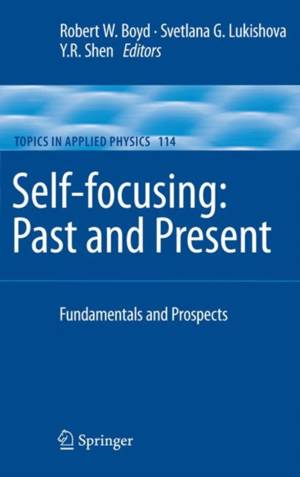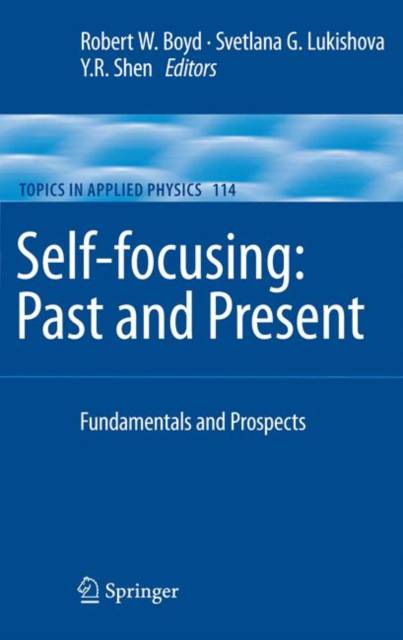
- Afhalen na 1 uur in een winkel met voorraad
- Gratis thuislevering in België vanaf € 30
- Ruim aanbod met 7 miljoen producten
- Afhalen na 1 uur in een winkel met voorraad
- Gratis thuislevering in België vanaf € 30
- Ruim aanbod met 7 miljoen producten
Self-Focusing: Past and Present
Fundamentals and Prospects
Omschrijving
Self-focusing has been an area of active scientific investigation for nearly 50 years. This book presents a comprehensive treatment of this topic and reviews both theoretical and experimental investigations of self-focusing. This book should be of interest to scientists and engineers working with lasers and their applications.
From a practical point of view, self-focusing effects impose a limit on the power that can be transmitted through a material medium. Self-focusing also can reduce the threshold for the occurrence of other nonlinear optical processes. Self-focusing often leads to damage in optical materials and is a limiting factor in the design of high-power laser systems. But it can be harnessed for the design of useful devices such as optical power limiters and switches. At a formal level, the equations for self-focusing are equivalent to those describing Bose-Einstein condensates and certain aspects of plasma physics and hydrodynamics. There is thus a unifying theme between nonlinear optics and these other disciplines.
One of the goals of this book is to connect the extensive early literature on self-focusing, filament-ation, self-trapping, and collapse with more recent studies aimed at issues such as self-focusing of fs pulses, white light generation, and the generation of filaments in air with lengths of more than 10 km. It also describes some modern advances in self-focusing theory including the influence of beam nonparaxiality on self-focusing collapse. This book consists of 24 chapters. Among them are three reprinted key landmark articles published earlier. It also contains the first publication of the 1964 paper that describes the first laboratory observation of self-focusing phenomena with photographic evidence.
Specificaties
Betrokkenen
- Uitgeverij:
Inhoud
- Aantal bladzijden:
- 605
- Taal:
- Engels
- Reeks:
- Reeksnummer:
- nr. 114
Eigenschappen
- Productcode (EAN):
- 9780387321479
- Verschijningsdatum:
- 17/12/2008
- Uitvoering:
- Hardcover
- Formaat:
- Genaaid
- Afmetingen:
- 163 mm x 236 mm
- Gewicht:
- 997 g

Alleen bij Standaard Boekhandel
Beoordelingen
We publiceren alleen reviews die voldoen aan de voorwaarden voor reviews. Bekijk onze voorwaarden voor reviews.










